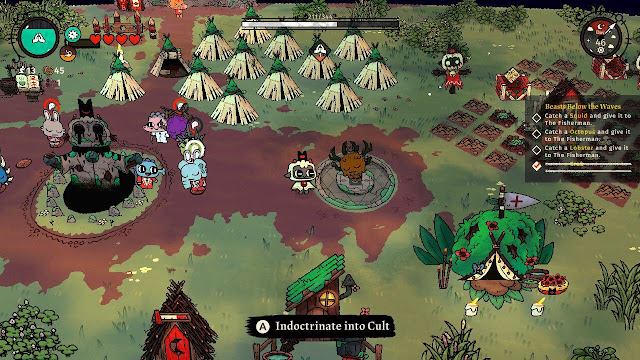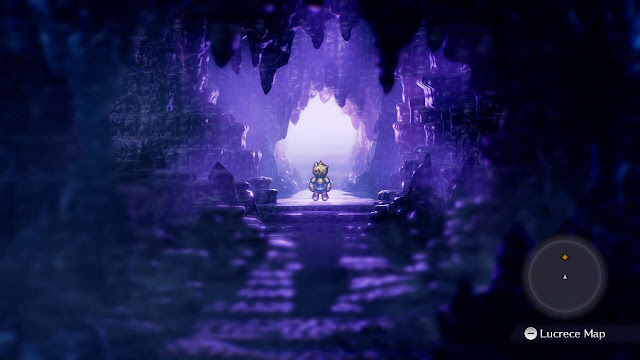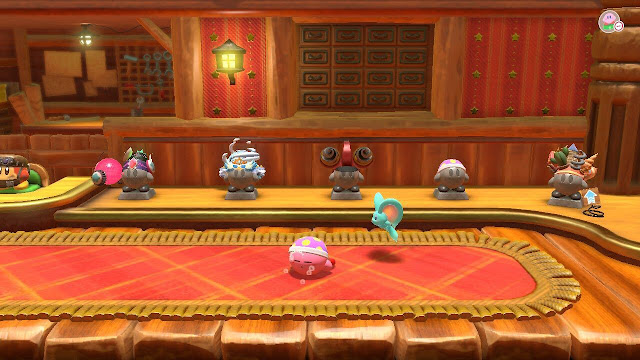 |
| Are ya winning, son? I don't know. |
Considering that I spent most of last year playing through some extremely long games, it's perhaps not a surprise that this year I gravitated towards games that offered a more condensed experience. Not necessarily games that could only be completed in a couple of hours (though there are a few that fit that description), but ones that you can pick up for 20-30 minutes, and then walk away feeling like you got something out of the experience.
That preference for shorter experiences explains some of the major absences on this list, so let's get them out of the way: I did not play Elden Ring, God of War: Ragnarok or Horizon Forbidden West. In part that's because they're all very long games and I was not in the mood for that this year, and partly because I have either a lack of experience with the previous games in those series/genres (I keep meaning to play the Soulsbourne games, and maybe this will be the year) or a lack of interest (I found the 2018 God of War pretty boring and not fun to play so didn't feel the need to run out and play the sequel). As such, those three behemoths of the year in gaming will not be on this list.
Before we get to the top ten, I have a few honourable mentions, which this year are a mix of older games that I played for the first time, games from this year that I really liked but just missed the cut, and ones that I didn't spend enough time with, but was impressed by what I saw.
Yakuza: Like a Dragon (PlayStation, Xbox, PC)
 |
| Grizzled Yakuza is about to have an extremely bad time |
I picked away at this spinoff from the main Yakuza/Like a Dragon series over the course of the year and finally finished it just days before the new year started. While it didn't quite hit the same highs as Yakuza 0 did for me, it's easily one of the best games in the series and the shift from the beat-em-up combat of the earlier games to turn-based RPG mechanics worked fantastically well, adding an extra layer of over-the-top ridiculousness to a series that has always gone big and delivered. I'm glad that I'm all caught up on the mainline series in time for the next installment, the remake of Like a Dragon: Ishin! that comes out in February.
Pentiment (Xbox, PC)
 |
| If you ever wished the Bayeux Tapestry was a game, that's pretty weird, but also Pentiment will suffice |
I played some of Pentiment when it came out in November, but didn't really get into it enough to include it in the top ten, but it's a beautifully-realized and engrossing game about history, not just as a setting but as a theme to be explored through point-and-click adventure mechanics. One of the most distinctive games of the year and I'm looking forward to playing it more in 2023.
Super Kiwi 64 (Switch, PC)
 |
| This looks so bad and so good at the same time |
A delightful hit of nostalgia that mimics the style and feel of N64-era collectathons like Banjo-Kazooie, which does not overstay its welcome since it takes literally an hour and a half to finish. Not a deep experience by any means, but a really excellent recreation of a specific style and vibe.
So now, here are the ten best games that I played in 2022.
10. Tunic (Switch, PlayStation, Xbox, PC)
 |
| This fox has seen some things |
Back when it came out in March, Tunic was a strong contender for my game of the year. I really loved the cute aesthetic, the total sense of mystery surrounding both what the game's story was about and even how to play it, since you only find out how to do most things in the game through trial and error, blind luck, or finding pieces of the game manual (which itself is written in a fictional language, so it's only moderately helpful) around the world. No game this year produced more "Eureka!" moments for me than Tunic, which constantly surprised me by how much of it was hidden in plain sight, and there was something so incredibly satisfying about discovering a new short cut because I happened to be wandering around and stumbled on it. However, I lost interest in the game once it got into the back half, and that ultimately determined its place on this list. A real triumph of design that is probably too opaque for its own good.
9. The Case of the Golden Idol (PC)
 |
| This Is Fine |
This detective game got a lot of comparisons to Return of the Obra Dinn, which is both a blessing and a curse, since that's incredibly high praise but also misrepresents what Case of the Golden Idol is going for. Whereas Obra Dinn has a high-concept magical realist mechanic underpinning the player's investigation of all its assorted crimes, Case of the Golden Idol is more traditional in its point and click mechanics, as it places you in a series of grim tableaux and asks you to figure out who everyone is and what happened by searching around and finding every possible piece of evidence. It's an extremely satisfying puzzle game with a pretty neat story and wonderful retro graphics.
8. Nobody Saves the World (Switch, PlayStation, Xbox, PC)
 |
| oh shit oh shit oh shit |
An early highlight of the year, this cute and inventive dungeon-crawler that allows you to transform into different character classes and animals and combine their abilities has a great, silly sense of humour and really rewards experimentation through its mix-and-match power system. Plus the wide variety of dungeons and side-quests in the game make it perfect for picking up and playing for half an hour or so, and coming away feeling like you've made some meaningful progress.
7. Cult of the Lamb (Switch, PlayStation, Xbox, PC)
 |
| Aww, so cute wait what |
There's a bit of a jack of all trades quality to this adorably dark genre mashup, consisting as it does of two distinct halves: one in which you run through a bunch of procedurally generated dungeons and use various powers and upgrades to clear rooms, rescue potential cult members and advance the main story, and one in which you manage the cult you have built around you, through such humdrum activities as cleaning up feces and committing ritual sacrifices. While neither of those elements are great (if you want a top-tier roguelike then Hades and The Binding of Isaac do that much better, and there's countless weird management sims that are more in-depth than what Cult of the Lamb offers) they are still pretty good, and the way the game combines the two makes for a novel loop of going out to get more cult members, then having your growing cult make you more powerful in order to go out and make more runs. And underpinning it all is a darkly funny sense of humour that really gives the game a distinct identity.
6. Knotwords (PC, Mobile)
 |
| Like all good crosswords, Knotwords has caused me to think of words like "Ulna" more times this year than I have in my entire life |
As someone who likes to decompress at the end of the day with the New York Times Crossword, I can't say I expected someone to come up with a new and exciting twist on one of the more rigid and established puzzles going. But with Knotwords, Zach Gage and Jack Schlesinger certainly made me look like a doofus. Basically a combination of a traditional crossword and sudoku, the game provides you with a fairly standard grid, which is then subdivided into smaller grids that tell you what letters you can use, and you then have to determine the order to create words and successfully complete the puzzle. It's a smart twist on an old favourite, and I've found doing the daily puzzles a nice way to get the gears working before I start work each day.
5. Live A Live (Switch)
 |
| When I took this screenshot, I thought "Oh this is pretty," not realizing that immediately after this the game takes an insanely dark turn |
My reaction to this remake of a 1994 JRPG that previously went unreleased in the West (though still proved influential since a lot of people imported it and took inspiration for it for their own work) had several phases. Initially, I thought it was a neat idea - the game consists of a series of short RPGs stories that take place in different time periods, ranging from prehistory to the distant future, with different characters and different mechanics in each - that was executed well, but which didn't initially grab me, so I played some of one of the stories and then planned to pick it up later. When I returned to it, I realized that I had picked one of the weaker stories (Near Future, for the curious) and tore through the rest, deeply impressed with how much variety and invention was on display, how different each section felt to play, and how well the short story approach worked, with each feeling like a self-contained quest that never ran too long. That got it on this list. Then I reached the point where all the stories converge, and was completely knocked out by how well it pulled all the threads together for a truly satisfying finale. The only thing I can think to compare it to is David Mitchell's novel Cloud Atlas, both in its approach and the cumulative effect of going through all of its stories.
4. Tinykin (Xbox, Switch)
 |
| Grinding around the levels in this game never gets old |
Like Super Kiwi 64, Tinykin draws inspiration from the 3D platformer design philosophy of the late '90s and early '00s, marries it to a simplified version of Pikmin, and throws it all into some surprisingly vast and complicated levels. The result is a hugely satisfying adventure that finds your character running around a giant version of a regular house, meeting various sentient bugs and trying to solve their problems using the titular creatures, who all have different abilities - some can stack to help you reach greater heights, some explode, some conduct electricity etc - that help you complete various puzzles. The exploration in this game feels fantastic, varying between walking, grinding on lines using a piece of soap that acts as a skateboard, and floating around in a bubble, all of which make the simple act of traveling around each area tremendously fun on a moment-to-moment basis. And, like many of the games on this list, it benefits from being a concentrated experience that you can finish in a few hours, so it never overstays its welcome.
3. Kirby and the Forgotten Land (Switch)
 |
| Bet he's dreaming of murder again |
This was the first mainline Kirby game I've ever played and it really made me want to go back and play the others, because this is quite wonderful. A pitch-perfect adventure story in which you guide a pink blob on his quest to kill God, Kirby and the Forgotten Land was one of the most consistently delightful games of the year. Not only are the levels varied and exciting enough to keep surprising you as you progress, the various powers Kirby can use via the distressingly named Mouthful Mode add a real sense of discovery to the whole thing. Playing through each level is equal parts about advancing the story and finding out what new way you're going to destroy adorable creatures.
2. Neon White (PC, Switch)
 |
| It pained me to stop trying for a better time after pausing to get this screenshot |
I have to apologize to everyone who follows me on Twitter for the month or so where every other tweet I posted was a clip of me doing something cool in Neon White. What's really amazing about the game is that it takes something that can be so difficult to get right - first-person platforming - and not only does it perfectly, but marries it to speedrunning, something which is generally pretty niche and considered the realm of only the very best or dedicated players, and makes it into a totally accessible and ridiculously fun experience. Beating the levels in this game as quickly as possible, and then trying to beat the times of my friends to try and get the top spot on every leaderboard, made Neon White one of the most compelling and purely enjoyable gaming experiences of the year for me. Seemingly everyone bashes the story, and it is very tropey and derivative of a lot of anime, but I didn't mind it. It's a cool setting within which to allow people to perform outrageous stunts, and I think that's lovely.
1. Vampire Survivors (Xbox, PC, Mobile)
 |
| A tad more legible than the first screenshot, huh |
I started playing Vampire Survivors back in February while it was in early access, and I had a good time with it. The basic concept was really intriguing yet extremely easy to grasp; you control a variety of characters who all look like legally dubious old Castlevania sprites and walk around a creepy and/or kooky location, killing monsters and picking up different weapons and power ups which gradually turn you into a frothing mound of death. It's a reverse bullet hell in which all you do is control the character's movements and choose what weapons to use or upgrade every time you go up a level. It was a cool idea, I played it for a few hours, and then I walked away happy with the time I had spent with it.
Then, a few months later, I heard that they had done a big update. And then they did another one, and another one, each time adding in new characters, new weapons, and new modes, to the extent that by the time the game properly came out in October, it was like four or five times bigger than it had been eight months earlier, and it was already a fairly robust experience to begin with. That sense of growth and progress kept me coming back and playing the game each time to see what new thing had been added, but what earns it the number one slot on my list is how, even as it grew in scope and ambition, the team behind Vampire Survivors never lost sight of the simple fun at the heart of the game, and instead enhanced and refined it. The game is still fundamentally as good as it was when it was in early access, it just gives you a lot more ways to play around with it, and the fact that the game remains as fun on my 300th run as it did on my first is largely why it tops my list for this year.